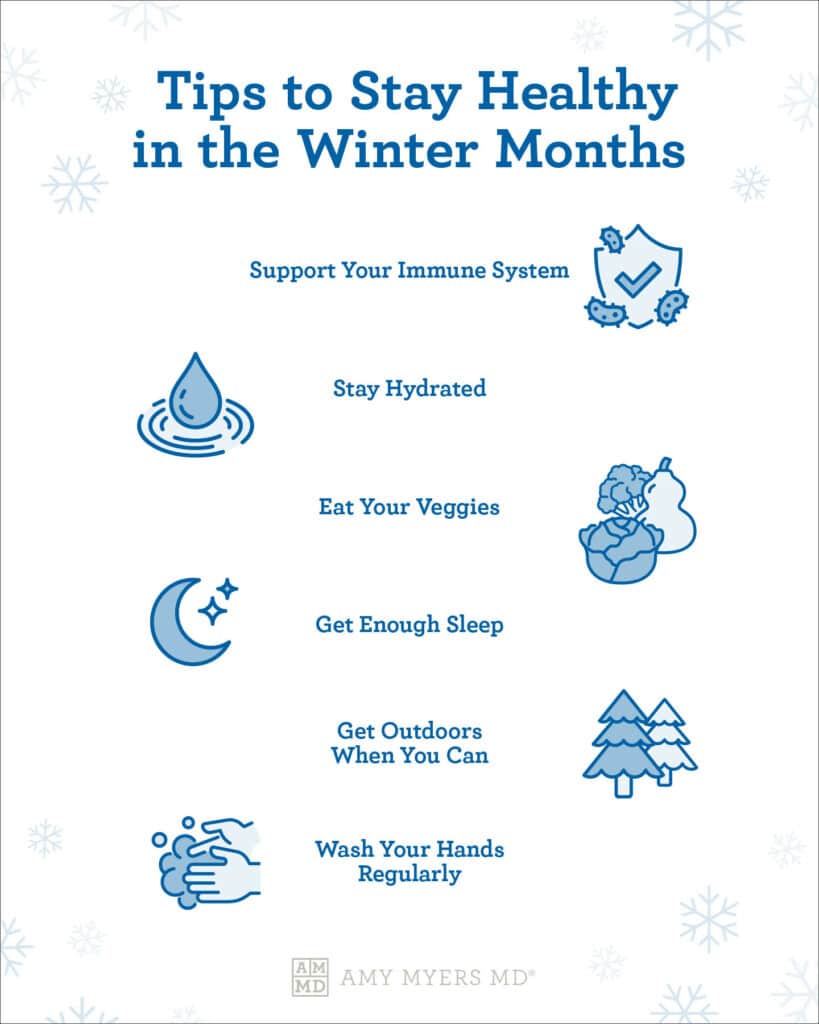Winter is an enjoyable time for so many of us. I just love cuddling up with my family with a hot cup of Peppermint Hot Cocoa in front of the fireplace. From warm cozy blankets, to the holidays, to skiing and sledding, and beautiful snow-filled scenery, winter is a really fun time of year for many of us. The first step to enjoying anything fun during the winter is of course staying healthy.
Winter can be hard on your health. You might get dehydrated as the dry, cold air causes your body’s fluids to evaporate faster. If you live in a cold environment, the lack of sunlight diminishes your vitamin D levels. You have added stress due to the holidays. Your immune system is required to work harder to fight viruses and bacteria invaders, which spread more easily in cold and dry air.
The good news is you can take steps to stay healthy in the winter months. I’m going to give you my winter health tips so you can take control of your health and enjoy the holiday season.
Staying Healthy in the Winter Months
With the flu season approaching, added to an ongoing pandemic, it is more important than ever to take steps to stay healthy in the winter months. We’ve all been told winter health tips such as wash our hands and get enough vitamin C so we stay healthy in the winter months. However there are issues with these seemingly simple tips – washing your hands too much can make your skin dry and you only absorb 12% to 14% of vitamin C in oral supplement form. Here are my winter health tips to stay healthy in the winter months.
 Dr. Amy Myers
November 7th, 2021
https://content.amymyersmd.com/article/winter-health-tips/Tips To Stay Healthy in the Winter Months – Infographic – Amy Myers MD®
Dr. Amy Myers
November 7th, 2021
https://content.amymyersmd.com/article/winter-health-tips/Tips To Stay Healthy in the Winter Months – Infographic – Amy Myers MD®Eat These Foods
You cannot have a healthy immune system without a healthy gut. Your gut health and immune system are allies in the fight against foreign invaders. When working correctly, it can distinguish between different types of bacteria, keeping the good and warding off the bad.1
A healthy gut also allows your body to absorb the nutrients it needs for optimal health.
Bone broth is at the top of my list as one of the most important foods to eat during the winter months. And not just because it is a delicious way to warm up your body in the cold winter months. Bone broth contains gelatin and collagen, two superstars for supporting a healthy mucosal lining, proper digestion, and intestinal function. Glucosamine in bone broth assists in repairing a leaky gut by supporting a healthy inflammatory response and stimulating the growth of new gut cells.2
Ginger is another superstar food in the winter months. Ginger gets its name from its active ingredient – gingerol. Gingerol reduces oxidative stress, is a free radical scavenger, and supports proper digestion. What’s more, ginger root is an age-old remedy for digestive complaints. Ginger is known for its ability to ease nausea and can help relieve stomach cramps, gas, bloating, constipation, and diarrhea. Ginger can also promote nutrient absorption.3
Beta-carotene- and vitamin C-rich foods are essential for staying healthy in the winter months. These foods include leafy green vegetables, sweet potatoes, pumpkin, carrots, and apricots. Avocados, blueberries, broccoli, brussels sprouts and cauliflower are foods that contain high amounts of vitamin C.
Zinc is a mineral that plays a crucial role in healthy skin appearance and white blood cell production, which is essential for a healthy immune system. There are plenty of foods rich in zinc, including sweet potatoes, grass-fed beef, free-range chicken, wild-caught fish, and dark chocolate.
Get Outdoors When You Can
During the winter months the days are shorter and sometimes the sun doesn’t come out at all. As I mentioned earlier, that can make it difficult to get enough vitamin D from the sun. Your body creates its own vitamin D when it is exposed to sunlight. Because it’s a fat-soluble vitamin, your body uses what it needs and stores the excess amounts in fat cells instead of removing it through your urine the way it does with water-soluble vitamins such as B vitamins.
If you’re finding yourself under the weather too often, that may be a sign that your vitamin D levels are suboptimal. Vitamin D works hand-in-hand with your body to modulate immune activity. Think of vitamin D as a light switch in your body, turning on or off genes and processes that your body needs for a healthy immune system.
When your body is exposed to the sun, the sun’s ultraviolet B (UVB) rays hit cholesterol in the skin cells, providing the energy for your body to make its own vitamin D3.4
Seasonal affective disorder (SAD) is very common in the winter months and research shows there is a direct link between a lack of UV rays from sunlight to produce vitamin D in your skin and SAD. A new study by the University of Georgia linked low vitamin D levels with greater risk of seasonal depression, which affects up to 10% of the US population though the fall and winter months.5
If you find that you’re limited on the amount of sunlight you can get during the winter months, a high-quality Vitamin D3 supplement is the best way to get vitamin D without the sun. Vitamin D3 is the form that is created in your skin when it is exposed to the sun. It also increases the levels of vitamin D in your blood more effectively than other forms of vitamin D.
Drink Plenty of Water
Your body uses water in all of its processes. In fact, 60% of your body is water. Your body uses water to regulate its temperature by sweating and respiration. It metabolizes and transports carbohydrates and proteins in the bloodstream. It assists in eliminating waste, forms saliva and lubricates your joints.
Most people believe that dehydration only happens during the summer days, or doing too much activity in hot and humid temperatures. However, do you remember what I said about sweating and respiration? The cold temperatures in the winter months cause your sweat to evaporate faster than it does in warmer temperatures. It’s true!
Other factors that can lead to dehydration in the winter include:
- You are less thirsty in cold weather, so the desire to drink water is lower. However, this doesn’t mean you are better hydrated.
- You sweat less. Sweat is an indicator of hydration, however if you aren’t sweating you may not realize you need to drink water.
That’s why it’s important to drink plenty of water to stay healthy in the winter months. You should aim to drink at least ½ your body weight in ounces. For example, if you weigh 130 pounds, you should drink 65 ounces of filtered water every day at the very least.6
Get Optimal Sleep
Sleep is a vital part of learning, memory retention, and even detoxifying your body. Inadequate sleep can impact your heart, brain, slow down your metabolism, cause depression and anxiety, and weaken your immune system and gut health.
The amount of sleep you need for gut health and your immune system depends greatly on your age. As you get older, your body and brain require less sleep to recover and develop. For example, a child between the ages of 0 to 5 needs between 10 to 14 hours of sleep each day, including naps.7
However, adults typically need 7 hours or more for optimal sleep.
The best way to get enough sleep is to follow 3 simple steps for optimal sleep.
- Eat foods rich in tryptophan, magnesium, and melatonin. Turkey, chicken, and shellfish are great sources of tryptophan, while bananas, avocados, and green leafy vegetables contain a lot of magnesium. Your body naturally produces melatonin, however you can also get it from pork, salmon and cherries.
- Skip fatty foods, rich proteins, chocolate, alcohol and coffee, and over-the-counter medications that could contain hidden caffeine and sugar. Check your labels!
- Having a regular sleep schedule, waking up early and going to bed early, exercise, and creating a bedtime routine are great ways to promote optimal sleep.
Sleep is a great way to naturally support your immune system. Taking these steps to get more sleep is a great way to stay healthy in the winter months. If you’re looking for added sleep support, I recommend Rest and Restore™. This physician-formulated combination of amino acids and minerals is designed to support falling asleep fast and also encourage deep and restful sleep so that your neurotransmitters, hormones, and your entire body have ample opportunity to replenish and rejuvenate overnight.
Wash Your Hands Regularly
You might have grown accustomed to washing your hands all the time due to the ongoing pandemic. However, it’s important that you don’t slack off during the winter months and continue to wash your hands regularly.
Your skin is your body’s largest organ. Not only is your skin your largest organ, your skin is also your first line of defense against the outside world. Your skin microbiome is connected to your gut, which regulates your immune system. Taking care of your gut is key to staying healthy in the winter months.
Just like your gut, your skin microbiome includes a wide array of organisms from bacteria, fungi, viruses, and even mites. Your skin is exposed to more bacteria, fungi, and viruses in the winter months.
The Centers of Disease Control and Prevention (CDC) recommends washing your hands at these times:8
- Before, during, and after preparing food
- Before and after eating food, caring for someone who is home sick, or treating a cut or wound
- After using the toilet, blowing your nose, coughing, sneezing, touching an animal, handling pet food or pet treats, and touching garbage
Washing your hands is the most effective way to not spread germs. You should wash your hands with clean, warm or cold filtered water. You should wash your hands for at least 20 minutes with soap. Be sure to check the ingredients to make sure your soap doesn’t contain “the dirty dozen” toxic ingredients. Singing the birthday song from beginning to end twice is a good way to ensure you’re washing for 20 seconds. Rinse your hands thoroughly and dry them with a clean towel.
Article Sources
- The Gut: Where Bacteria and Immune System Meet. Helen Fields. John Hopkins Medicine. 2021.
- Effects of Glucosamine and Chondroitin Sulfate on Cartilage Metabolism in OA: Outlook on Other Nutrient Partners Especially Omega-3 Fatty Acids. Jöng Jerosch. International Journal of Rheumatology. 2011.
- 5 Ways Ginger Benefits Digestion. Melissa Gunderson. Gut Health Project. 2016.
- Sunlight and Vitamin D. Matthias Wacker. Dermato-endocrinology, vol 5. 2013.
- Low levels of vitamin D can increase your risk of seasonal affective disorder. SSM Health. 2021.
- Water and Your Diet: Staying Slim and Regular With H2O. Gina Shaw. WebMD. 2019.
- Recommended Amount of Sleep for Pediatric Populations: A Consensus Statement of the American Academy of Sleep Medicine. Shalini Paruthi MD, et al . Journal of Clinical Sleep Medicine. 2016.
- When and How to Wash Your Hands. Centers for Disease Control and Prevention. 2021.
